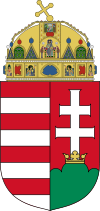- Hungarian nationality law
-
Hungarian nationality law is based on the principles of jus sanguinis. Hungarian citizenship is acquired mainly on the basis of a Hungarian parent, or by naturalisation. Children born in Hungary to foreign parents do not generally acquire Hungarian citizenship. Every Hungarian citizen is also a citizen of the European Union.
The existing Hungarian nationality law dates from 1993. Prior to this date, rules for acquisition and loss of Hungarian citizenship may have been different. With the new Hungarian nationality law, by January 2011, every person who was a Hungarian citizen or is a descendant of a people who was a Hungarian citizen before 1920, and speaks Hungarian may apply to become a Hungarian citizen even if he or she does not live in Hungary. As of July 22, 2011, more than 120,000 applications have been filed and 20,000 people have been granted citizenship thanks to the new nationality law. These people are mostly from Transylvania (Romania), Vojvodina (Serbia) and Ukraine
Dual citizenship is permitted under Hungarian law.
Contents
Citizenship by birth and adoption
A person acquires Hungarian citizenship at birth if at least one parent is a Hungarian citizen. The place of birth is irrelevant.
Children born in Hungary to foreign parents do not acquire Hungarian citizenship at birth unless they would otherwise be stateless.
Minor children adopted by Hungarian citizens may normally be granted Hungarian citizenship.
Naturalisation as a Hungarian citizen
A person may be naturalized as a Hungarian citizen on the basis of the following requirements:
- 8 years continuous residence in Hungary
- no criminal past
- a stable livelihood
- good character
- passing a test in basic constitutional studies.
The residence requirement is reduced to 3 years for:
- spouses of Hungarian citizens who have been married for three years (or who are widows or widowers).
- parents of Hungarian citizen minor children
- persons adopted by Hungarian citizens
- recognised refugees
The 2011 Hungarian Citizenship law allows all ethnic Hungarians to apply for simplified naturalisation if they are able to prove knowledge of the Hungarian Language and provide evidence that he or she does indeed have Hungarian ancestry.
A 5 year residence requirement applies to a person who is:
- born in Hungary; or
- established residence in Hungary before age 18; or
- is stateless
Applicants aged 65 or over, those of diminished capacity, and persons holding a Hungarian language diploma (from a Hungarian institution) may be exempted the constitutional studies requirement.
Hungarian citizenship by declaration
Declaration is a simplified form of naturalisation. The following persons may be eligible to acquire Hungarian citizenship by declaration:
- persons who lost Hungarian citizenship through emigration between 15 September 1947 and 2 May 1990.
- Stateless persons aged less than 19, born in Hungary and residing in Hungary for the 5 years prior to the declaration.
Oath of allegiance
Persons becoming naturalised Hungarian citizens are expected to take an Oath of Allegiance as follows:
- "I, (name), do solemnly promise that I shall consider Hungary my country. I shall be a loyal citizen of the Republic of Hungary, and shall honour and observe the Constitution and laws thereof. I shall defend my country as far as my strength allows, and shall serve it according to the best of my abilities allow."
Those who prefer may take an equivalent solemn promise instead of an oath.
Loss of Hungarian citizenship
It is not possible for a person to lose Hungarian citizenship involuntarily. The exception concerns fraudulent applications for naturalisation (subject to a 10- year time bar after which action cannot be taken).
Hungarian citizens who hold another nationality and live outside Hungary may renounce their Hungarian citizenship.
External links
Nationality laws (category) By continent AfricaAsiaArmenia · Azerbaijan · Bangladesh · Bhutan · Burma (Myanmar) · China · Cyprus (Northern Cyprus1) · India · Indonesia · Iran · Iraq · Israel · Japan · Kazakhstan · South Korea · Lebanon · Malaysia · Mongolia · Nepal · Pakistan · Philippines · Russia · Singapore · Taiwan · TurkeyOceaniaEuropeAndorra · Austria · Belarus · Belgium · Bulgaria · Croatia · Czech Republic · Denmark · Estonia · Finland · France · Germany · Greece · Hungary · Iceland · Ireland · Italy · Kazakhstan · Latvia · Lithuania · Luxembourg · Macedonia · Malta · Moldova · Monaco · Montenegro · Norway · Netherlands · Poland · Portugal · Romania · Russia · Serbia · Slovakia · Slovenia · Spain · Sweden · Switzerland · Ukraine · United KingdomNorth AmericaSouth AmericaInternational
organizationsBy type Other Defunct Notes 1 Partially unrecognised and thus unclassified by the United Nations geoscheme. It is listed following the member state the UN categorises it under.Categories:- Hungarian law
- Hungarian nationality law
Wikimedia Foundation. 2010.

